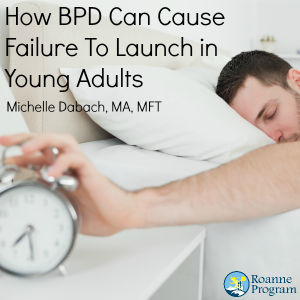How BPD Can Cause Failure To Launch In Young Adults
 Failure to Launch (FTL) and Borderline Personality Disorder (BPD) can, in many ways, be intertwined. The question of BPD contributing to FTL has come up many times for me in the past several weeks in my role as an admissions counselor at OPI Intensive, a residential transitional living program in Southern California exclusively for young adult men and women with Borderline Personality Disorder, BPD traits, and co-occurring issues. Let’s begin by exploring each challenge individually and how suffering from BPD can really affect one’s ability to launch successfully into adulthood.
Failure to Launch (FTL) and Borderline Personality Disorder (BPD) can, in many ways, be intertwined. The question of BPD contributing to FTL has come up many times for me in the past several weeks in my role as an admissions counselor at OPI Intensive, a residential transitional living program in Southern California exclusively for young adult men and women with Borderline Personality Disorder, BPD traits, and co-occurring issues. Let’s begin by exploring each challenge individually and how suffering from BPD can really affect one’s ability to launch successfully into adulthood.
Borderline Personality Disorder is described as a disorder of emotion regulation. Someone suffering from BPD may experience intense bouts of anger, depression, and anxiety that is more transient than the shifts in mood seen in other disorders, such as bipolar. Episodes may also include impulsive aggression, self-injurious behaviors, and/or substance abuse.
Failure to Launch is the phenomenon assigned to young adults finding it difficult to transition from adolescence into adulthood. More young adults are living at home today than 30 years ago. Back in the 1970s, it was commonplace to be married with a kid on the way by 22 years old. Nowadays, our 22 year olds are just finishing up college and trying to figure out their next steps. Along with this may come depression and anxiety from not knowing what to do next and, most likely, being ill prepared financially and socially to join the real world.
Here’s where the interconnection of Borderline Personality Disorder and Failure to Launch Syndrome comes into play. Let’s assume a young adult is suffering from mental health issues but is functional in society – goes to school, has a part time job, friends. If this individual has Borderline Personality Disorder, all of a sudden, things change. The motivation to go to school starts declining because of the constant emotional dysregulation. This makes it extremely difficult to go to school with any regularity, much less achieve the grades that the individual is really capable of achieving. Add to this the individual’s inability to keep a job, which inevitably means there is financial hardship and no apartment. Now, this young adult is living back at home (or has never left) and, with each and every failure, is becoming more depressed and less motivated. It would appear that the BPD has contributed to the individual’s failure to launch.
Many parents fall into the trap of enabling at this point, as it intuitively may seem like the loving thing to do. Our fictional young adult with BPD has stopped trying to accomplish any achievements because of his constant failures, so his parents give him a place to live, food to eat, and money to spend. The problem is, now, there’s no reason to try to achieve going back to school or keeping a job. Mom and dad have handled the problem, as they have all those years ago in childhood. But, they haven’t really. Now, mom and dad are contributing to the problem instead of dealing with it. The simplest answer would be to get mental health help and encourage, via small goals, the young adult to start attempting achievements again.
But, the tough answer, the one that everyone shies away from, is getting the right mental health treatment, which may include genetic testing to find medications that can help with underlying anxiety, depression, and mood instability, finding a support group (for both the parents and the young adult), and then making those very small goals to promote success until a larger goal gets completed. This is the harder route, and it is much easier to give in and let your child become the center of your world once again; however, this time around, it will get more frustrating faster because your child is now an adult.
They should be able to function in society. Instead of giving in and handling their problem for them, parents need to make it a little more challenging. Be there. Love your child. Support them. But don’t contribute to the ever growing and potentially debilitating problem of Failure to Launch Syndrome. Help your young adult get the real help they need. Help them overcome BPD! But, do not give in. It’s easier said than done, but there is possible with the right services and treatment in place.
At OPI Intensive for young adults with Borderline Personality Disorder and BPD traits, we intensively integrate DBT as part of your treatment plan. We offer compassionate, clinically sophisticated intensive residential help, including genetic testing to determine the best course for medications, if needed. Rather than a sterile, hospital-like environment, we offer beautiful accommodations in luxury apartments just outside of Los Angeles. At OPI Intensive, we treat the individual, not the diagnosis. Our clinical team is made up of a diverse community of passionate, highly skilled individuals working together with you to help you find your joy and express it. For more information on OPI Intensive residential programs and our measures to help young adults with Borderline Personality Disorder, call us at 866-661-3982 or click HERE to submit an online form. We’ll be in touch promptly.
